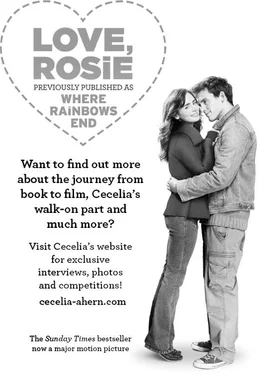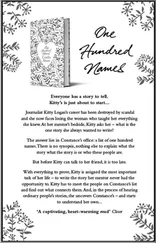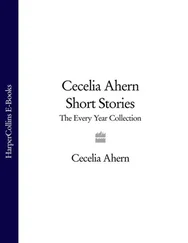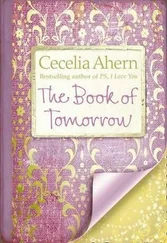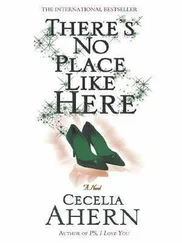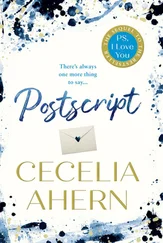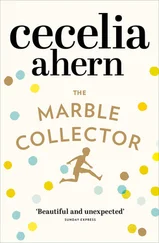Cecelia Ahern - The Year I Met You
Здесь есть возможность читать онлайн «Cecelia Ahern - The Year I Met You» — ознакомительный отрывок электронной книги совершенно бесплатно, а после прочтения отрывка купить полную версию. В некоторых случаях можно слушать аудио, скачать через торрент в формате fb2 и присутствует краткое содержание. Год выпуска: 2014, Издательство: HarperCollins Publishers, Жанр: Современная проза, на английском языке. Описание произведения, (предисловие) а так же отзывы посетителей доступны на портале библиотеки ЛибКат.
- Название:The Year I Met You
- Автор:
- Издательство:HarperCollins Publishers
- Жанр:
- Год:2014
- ISBN:нет данных
- Рейтинг книги:3 / 5. Голосов: 1
-
Избранное:Добавить в избранное
- Отзывы:
-
Ваша оценка:
- 60
- 1
- 2
- 3
- 4
- 5
The Year I Met You: краткое содержание, описание и аннотация
Предлагаем к чтению аннотацию, описание, краткое содержание или предисловие (зависит от того, что написал сам автор книги «The Year I Met You»). Если вы не нашли необходимую информацию о книге — напишите в комментариях, мы постараемся отыскать её.
The Year I Met You — читать онлайн ознакомительный отрывок
Ниже представлен текст книги, разбитый по страницам. Система сохранения места последней прочитанной страницы, позволяет с удобством читать онлайн бесплатно книгу «The Year I Met You», без необходимости каждый раз заново искать на чём Вы остановились. Поставьте закладку, и сможете в любой момент перейти на страницу, на которой закончили чтение.
Интервал:
Закладка:
15
It’s Saturday and as soon as I open my eyes to the golden light in my bedroom I want to leap out of bed, throw a tracksuit on and race outside to the garden, like the boy in The Snowman who can barely contain himself, he’s so eager to see his new friend. Of course in my case it’s not a snowman but a pile of rocks that I need to place on my sloping garden.
While I’m outside looking at the stones, Amy arrives with the children. They get out of the car and slowly, unhappily trudge away from her. You open the front door, and before you can get down the driveway to greet her she takes off. You are left watching her drive away. Not a good sign. The children hug you – not Fionn, he just carries on dragging his feet all the way up the driveway and into the house.
Finally there’s silence, and I like that, only it doesn’t last long. Mr Malone is back in his garden and I can hear him brushing his paving stones.
‘You shouldn’t power-hose,’ he says, noticing me watching him. He’s on his knees, scrubbing the stones by hand. ‘It ruins the look of the stone. I’ve got to have the place looking tidy for Elsa. She’ll be home tomorrow.’
‘That’s great to hear, Jimmy.’
‘Not the same,’ he says, clambering to his feet and walking to meet me in the middle where his shrubbery and grass ends and where my car and paving begin.
‘Without her?’
‘With her, without her. She’s not the same. The stroke, it …’ He nods to himself, as if finishing the sentence in his own head and then agreeing with it. ‘She’s not the same. Still, Marjorie will be happy to see her. I’ll tidy around in there as well, but I don’t know if she’ll notice a great deal.’
My spell of duty feeding Marjorie ended as soon as Dr Jameson returned from his holiday, but I’d noticed that Jimmy hadn’t been coping too well without his wife around. The kitchen sink was piled with dirty dishes and a foul odour emanated from the fridge. It wasn’t much and it wasn’t invasive, but I’d cleaned the dishes and thrown out the mouldy vegetables and the milk that had gone off in the otherwise empty fridge. He was so used to being looked after domestically that he hadn’t noticed, or at least he hadn’t commented. Still, once Dr Jameson returned to his hands-on neighbourly role, I doubted his duties would include dishwashing. Though his duties with you last night, if that’s what they were, had extended to 3.30 a.m. What you both talked about till then – you blind-drunk, singing and shouting, and Dr Jameson in his North Face jacket and his suntan – is a mystery to me.
I leave a respectful silence, though I know he hadn’t expected an answer. Then I ask, ‘Jimmy, when is the best time to plant a tree?’
He snaps out of his maudlin mood, perking up instantly at the question. ‘Best time to plant a tree, eh?’
I nod, and immediately regret asking. I’m probably in for a long-winded answer.
‘Yesterday,’ he says, then chuckles, the sadness still in his eyes. ‘Like everything else. Failing that, now .’ Then he goes back to cleaning his stones.
Your door opens and Fionn steps out, dressed all in black, hoodie covering most of his face, but the teenage spots and freckles belie his eerie choice of clothing. He comes straight to me.
‘Dad told me to help you,’ he says.
‘Oh.’ I’m not sure how to respond. ‘I’m, erm, I don’t need help. I’m okay, really. But thanks.’ I like the peace of working alone. I don’t want to have to make small talk or explain what it is I want done. I’d rather just get on with it by myself.
He’s staring at the rocks longingly.
‘They look heavy.’
They do indeed look heavy. I remind myself I don’t need help, I never ask for help. I’d rather do things myself.
‘I don’t want to go back in there,’ he says, so quietly that when I look at him staring at the rocks it’s as if he hasn’t spoken and I question whether I really heard it. How can I tell him no after that? And I wonder whose idea it was to come out here and help me. I doubt it was yours.
‘Let’s start with this one,’ I say. ‘I want to put it over here.’
Having Fionn there makes me move more quickly, make decisions faster than I otherwise would have. At first I struggle to come up with things to say to him – cool things, witty things, young things – but as time wears on and his monosyllabic answers continue, I realise he no more wants to chat than I do. And so we labour on in silence, starting from the bottom of the slope and working our way up, the only communication a word here or there about moving a stone to the right, to the left – that kind of thing. As the hours pass, he starts offering suggestions as to where to place things.
Eventually we stand back, sweating and panting, and examine the rocks. Happy with their position, we set about thoroughly embedding each rock so it’s securely in place, at least half of the rock buried below the ground. We mix planting compost and sharp sand to make sure the rocks stay in place. On the next level we move the smaller rocks, leaving plenty of pockets for plants. At each stage we stand back and take a good look from different viewpoints.
Fionn is quiet.
‘It will look better with the plants and flowers in,’ I say self-consciously, protective over my patch.
‘Yeah,’ he says in a tone I can’t read. His voice is a monotone, expressionless, seeming to care and not care at the same time.
‘I’m thinking of putting a water fountain in,’ I say. I have looked into this and am excited to have found a video demonstrating how to build a water fountain in eight hours. I’m further excited to see that I can use my Indian sandstone for the actual fountain.
We’re both silent as we survey the garden for a place.
‘You could put it there,’ he says.
‘I was thinking more over here.’
He’s quiet for a moment, then: ‘Where’s the nearest electrical socket?’
I shrug.
‘You’ll need that for the pump. Look – you have lights.’ He goes on a wander around the garden, seeking out the source of electricity for my garden lights. ‘Here. It would be better to put it near here.’
‘Yeah,’ I say, my voice as even as his – not meaning to, but it’s addictive. It’s so much easier not to make an effort, I can understand why he does it. ‘I’m going to put a pipe up through the middle of the stones like this, see.’ I layer the sandstones on top of one another to show him. ‘The water will come up through the middle.’
‘Like, explode?’
‘No, like … gurgle.’
He nods once, unimpressed. ‘Are you going to do that now?’
‘Tomorrow.’
He looks disappointed, though it’s hard to be certain, given the general drift between nonchalance and misery. I don’t invite him back tomorrow. I haven’t minded his company, but I prefer to do this alone, particularly as I don’t know what I’m doing. I want to find my way by myself, not have to discuss and explain it. Not that there would be much discussion with Fionn.
‘Are you going to use them all?’
‘Half of them.’
‘Can I have the other half?’
‘For what?’
He shrugs, but it’s clear he has something in mind.
I look at him, waiting for more.
‘To smash them.’
‘Oh.’
‘Can I borrow this?’ He indicates my rubber mallet.
It’s the most hopeful I’ve ever seen him look.
‘Okay,’ I say uncertainly.
He places the paving stones in the wheelbarrow and wheels it across the road to your table. Then he comes back for more. It’s as he is doing this that you come outside to see what he’s doing. You actually ask him what he’s doing, but he ignores you and returns to my garden for more stones. You watch him for a moment then follow him.
Читать дальшеИнтервал:
Закладка:
Похожие книги на «The Year I Met You»
Представляем Вашему вниманию похожие книги на «The Year I Met You» списком для выбора. Мы отобрали схожую по названию и смыслу литературу в надежде предоставить читателям больше вариантов отыскать новые, интересные, ещё непрочитанные произведения.
Обсуждение, отзывы о книге «The Year I Met You» и просто собственные мнения читателей. Оставьте ваши комментарии, напишите, что Вы думаете о произведении, его смысле или главных героях. Укажите что конкретно понравилось, а что нет, и почему Вы так считаете.
